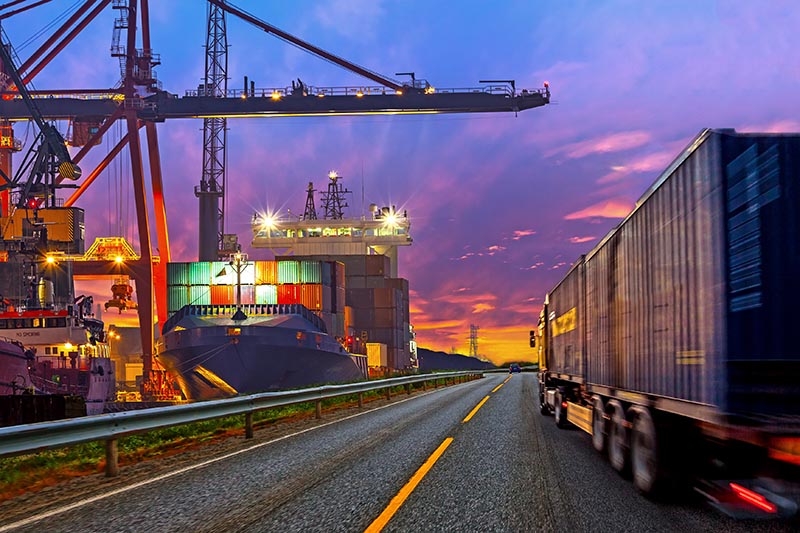
When selecting a cargo policy insurance, you have many options to choose from. Understanding your specific needs, along with the different types of cargo insurance policies, will help you make the right choice.
What Is a Cargo Insurance Policy?
Cargo insurance, also called freight insurance, protects a carrier from liability for ruined cargo. Whether you suffer physical loss or damage, if the cargo cannot be delivered per contract, the cargo carrier is financially liable for the freight.
A cargo insurance policy will pay a claim up to the amount covered on the policy. This coverage can protect your company from financial loss or even bankruptcy, so carefully selecting the right policy is imperative.
Is Cargo or Freight Insurance Legally Required?
According the the FMCSA, cargo or freight insurance is not legally required unless you are a Household Goods Motor Carrier or a Household Goods Freight Forwarder. However, many carriers and companies obtain cargo policy insurance to mitigate their chance of loss should something unforeseen happen.
What Are the Different Types of Cargo Insurance Policies?
There are many different types of cargo insurance policies available to carrier companies. Understanding what they are and the differences between them will help you choose the best coverage for your situation.
Learn about the different types of freight insurance to select the right coverage for your business needs.
Land Cargo Insurance
Land cargo insurance covers a shipment while it is being transported on land. Generally, this coverage applies to cargo that is aboard a truck, although it can also provide coverage for goods loaded on other utility vehicles as well. This is the most common freight insurance carried by trucking companies. Some of the incidents that land cargo policies cover are:
- Theft
- Damage caused by collision
- Damages incurred during load/unload
- Temperature units that malfunction
Marine Cargo Insurance
Marine cargo insurance covers any leg of the cargo’s journey that takes place over air or sea. This policy, unlike land cargo insurance, also applies to international transportation. Common coverages with marine cargo policy include:
- Damage during load/unload
- Bad weather
- Piracy
All Risk
All risk is one of the broadest types of cargo insurance policies that is available, covering a wide range of outside factors that result in physical loss or damage. This type of policy is more notable for what it doesn’t cover. Some exclusions to an all risk policy include:
- Negligence
- Inherent vice (deterioration of cargo caused by its inherent nature)
- Cargo rejection by Customs
- Cargo abandonment
- War, strikes, riots and civil commotion (WSRCC)
Warehouse to Warehouse
A warehouse to warehouse clause is used for supply chain transit and specifically covers freight that is on its way to a customer’s warehouse. This clause typically covers cargo from the moment it leaves one warehouse until it arrives at another; separate freight insurance is required to cover both before and after transportation, including during load/unload.
Named Perils Policy
A named perils policy covers specific dangers that are delineated in the policy. These types of cargo insurance policies were formerly referred to as “free of particular average” policies and are generally more limited than other, broader types of coverage. Also named perils policies, they are added to other coverage when the circumstances of a particular shipment cause special concerns. Some types of loss that can be covered include:
- Vessel collision or sinking
- Derailment
- Non-delivery of cargo
- Bad weather that causes delay or loss
- Fire, earthquake or other natural disasters
Contingency Cargo
Contingency cargo insurance is typically held by freight brokers and logistics service providers to cover any gaps in coverage in the carrier’s freight insurance policy. It provides broad protection if something goes wrong during any leg of the shipping process.
Specific Cargo
Occasionally a certain shipment requires coverage in addition to what is protected under a carrier’s liability policy. These instances call for a specific cargo policy, designed to protect only a certain shipment or load.
This may be necessary when the value of a load of cargo exceeds the limits of the carrier’s general policy. It also can provide coverage when cargo policy insurance is not available or does not apply; for instance, specific cargo insurance covers shipments that cross the Mexican border, which is not covered under cargo policy insurance.
Are There Other Things That Cargo Policy Insurance Does Not Cover?
In addition to shipments that cross the Mexican border, there are other items that freight insurance does not typically cover. Often these exclusions include:
- The actual shipping container
- Cargo that may explode or is radioactive
- Live animals
- Jewelry or art
- Money
- Contraband items, prescription medications, tobacco and alcohol
- Personal items that belong to the driver
If your situation requires coverage for items like these, be sure to review your policy carefully and purchase additional insurance if necessary.
How Do You Purchase Cargo Policy Insurance?
To purchase freight insurance or any of the types of cargo insurance policies discussed here, contact your trusted insurance professional today.
